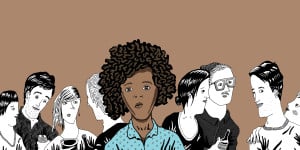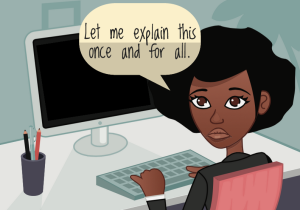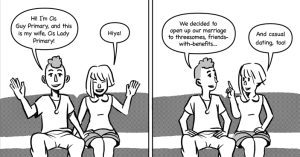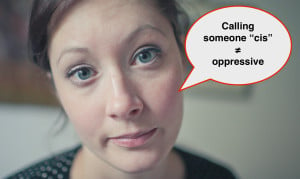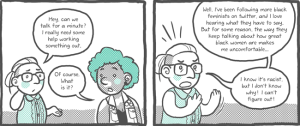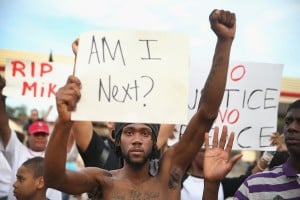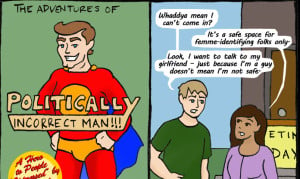
Source: Armando Trull – Activists protest against inadequate police response to crimes against the transgender community.
It’s a strange and exciting time to be a trans woman of color in North America.
TIME Magazine recently named the twenty-first century the “transgender tipping point” because of the unprecedented level of representation that trans people are currently experiencing in mainstream media.
This is due in large part to the work of high-profile trans activists such as Janet Mock, Laverne Cox, and CeCe MacDonald, as well as the recent upswing of TV shows and movies that are either trans themed or include transgender characters like Transparent, Orange Is the New Black, Dallas Buyers Club, Sens8, and Glee.
Most recently (and, perhaps, notoriously), Caitlyn Jenner of Olympic Gold and Kardashian fame publicly transitioned to an enormously positive response, appearing on the cover of Vanity Fair and receiving an Arthur Ashe Courage Award on national television.
Trans people, and especially trans women, are more visible than ever before.
None of this seemed even remotely possible ten years ago – it’s truly an amazing shift.
Yet there is also something odd that I’ve noticed about the conversations and news articles and social media posts buzzing excitedly about the “transgender revolution,” an elusive feeling of discomfort that I couldn’t quite articulate.
For some reason, I didn’t feel as joyful as many of my cisgender friends and acquaintances seemed to about the growing public dialogue around trans celebrities.
“You’re so lucky to be transgender now instead twenty years ago. We’re living in a better world for people like you,” one of my grad school professors said to me happily.
I smiled and nodded robotically, full of feelings I couldn’t name.
Was I just a killjoy? I wondered. Was there some part of me that just fundamentally bitter and cynical and incapable of being satisfied with anything in the universe?
The answer finally came to me when I wrote and published an open letter about why some trans people, particularly trans people of color, do not feel that Caitlyn Jenner, as a mega-rich white woman, represents their life experiences.
Although the reaction to the article was largely positive, it also generated many angry comments from cisgender readers telling me that I shouldn’t “be a hater” and that I should just “be happy that so much awareness is being raised” about “transgender issues.”
Sort of ironically, it was in the moment of reading those comments that I realized the truth: I wasn’t a killjoy or a hater, and I am genuinely thrilled that trans people can make it as celebrities.
What bothers me is the idea that transphobia is “over” and the entire world is a “better place” just because a handful of trans women and transgender stories that aren’t totally negative have started to be included in mainstream media.
What bothers me is the replacement of relatively shallow concepts like “raising awareness,” “visibility,” and “inclusion” for deeper, more meaningful, more radical social change.
Raising awareness, visibility, and inclusion are not enough – not for change, and certainly not for celebration.
The truth is that we’re too often taught to think of social justice and measure social change in terms of awareness, visibility, and inclusion.
There’s this idea that if something is wrong, then the best way to do something about it is to share it on Facebook, create a media campaign, have a celebrity talk about it. In some cases, this is certainly true – after all, knowledge is power.
But these ways of thinking about social justice can also be inadequate, misleading, or even harmful when taken out of context.
Worse, they can distract us from finding more effective ways to push for the changes we want to see in the world.
Here’s how.
1. The Unawareness of What Awareness Really Does
I can’t even remember the first time that I heard about “raising awareness” – probably in elementary school while learning about the coming extinction of whales and tigers.
We’re inundated with campaigns to raise awareness: for climate change, cancer, gendered violence, human rights.
These campaigns are the only route that most of us are given to become socially engaged, and a lot of them are massive, trademarked annual events.
In high school alone, I remember participating in the 24-Hour Famine (to raise awareness of world hunger), 7 Days Outside for the Homeless (to raise awareness of homelessness), Night of a Thousand Dinners (to raise awareness of landmines), and the Day of Pink (to raise awareness of bullying) every year.
After a while, all of these issues that I was raising awareness for started to blur together – and I started to wonder what actual effect raising awareness would have. Sure, we usually raised money along with all that awareness, but I never got to see where it actually went or have a hand in deciding how it got used.
Nowadays, I have to wonder if at least some of these gigantic campaigns into which so many people pour their efforts and good intentions are actually industries based on keeping themselves in business as much as making social change.
More troublingly, as a trans woman and a person of color, I’m starting to see that raising awareness around social justice issues can unintentionally become more about making would-be allies feel good about themselves than it is improving the lives of oppressed people.
When my cisgender acquaintances post articles about how inspired they are by Laverne Cox or how outraged they are by transphobia, I have to wonder: Where am I in all this? Am I being “saved,” the same way that I “saved” the whales in the first grade?
Raising awareness fails when it’s not paired with meaningful action on the part of those whose awareness was raised. In other words, simply knowing that trans people exist and face oppression doesn’t automatically translate into being less transphobic or taking action to making trans people safer.
This becomes starkly clear when we consider the fact that despite the “transgender tipping point,” the drastic situation of unemployment, lack of access to medical care, and exposure to violence for transwomen has not significantly changed.
In fact, eleven trans women have been reported murdered in North America alone this year. Trans friends of mine are still being denied access to hormone therapy, surgery, and changes to their sex designations on legal documents. “Gender identity” is still not protected under human rights charters in the vast majority of countries in the world.
When my professor tells me that I’m lucky to be transgender in this decade, that we are living in a better world, I have to wonder how she got this idea. And better for who?
2. The Invisible (Lack of) Effects of Visibility
In the same way that the concept of “raising awareness” can create misconceptions about how social change happens, so does the related concept of visibility of oppressed people.
This is the idea that if members of an oppressed group appear or are discussed in the media, their position to society automatically changes for the better.
This is the kind of thinking that leads allies to believe that if members of minorities can become famous as entertainers or public personalities, then the goal of social equality has been reached.
Unfortunately, this isn’t quite true.
While the presence of oppressed individuals in the media certainly indicates the beginning of an increasing public perception of minority groups, this doesn’t always mean that the increase in visibility has positive effects, particularly for those of us who aren’t celebrities.
We tend to overestimate the power of fame in North American culture.
The fact that there are trans people on TV doesn’t necessarily make it easier for me to go to a public bathroom, or travel using ID with my assigned (birth) sex on it.
Similarly, the fact that there have been many famous Black musicians and actors in America in the past century has never changed the fact that Black folks are routinely the subject of racial profiling and police violence.
For oppressed people who have historically relied on stealth or invisibility to avoid danger and discrimination, increased visibility can actually also have negative consequences.
Trans people, for example, have historically been hidden from the public eye, and many trans folks today still rely on “passing” as cisgender in order to find employment and walk the streets in relative safety.
Being more exposed to the mainstream doesn’t just mean gaining more allies, it can also mean being exposed to more hatred.
It’s worth noting that in the past two years of trans visibility, several transphobic bills have been introduced in federal and state governments in the US and Canada.
Being more visible can bring about violent backlash from conservative groups that feel threatened – so if we’re going to be more visible, we also need more protection.
3. This Is Who’s Excluded When We Focus On Inclusion
Perhaps most importantly, the problem with thinking about social change as only raising awareness and social progress as only increased visibility is that this way of thinking limits what we can do as activists.
When we rely on raised awareness to bring about change, we’re asking for someone else to come along and “save” marginalized people. We’re asking to be included in a game of media representation that’s stacked against oppressed groups to begin with.
The truth is, inclusion isn’t enough to end oppression.
Asking for marginalized folks to be included in television, in politics, in basic human rights, puts us in the position of the passive victim, waiting to be saved. And it sets up false expectations for the few of us who do make it into the media spotlight or into a political office.
One trans celebrity isn’t going to be able to change things for all trans people, and one Black president isn’t enough to bring about the end of racism.
When we think about inclusion as the end goal of raising awareness and increased visibility, we can fall into the trap of tokenization: believing that a handful of minority faces in public positions is the same thing as equal opportunity for everyone.
From Raising Awareness to Empowerment
So what should we be fighting for then, if not to raise awareness and inclusion?
I like to think that the beginning of the end of oppression is empowerment.
This means fighting for the right of oppressed groups to self-determination about the issues that directly affect them. As disability activist and transgender advocacy groups often say, “Nothing about us without us!”
In practical terms, empowerment means ensuring that regular (non-celebrity) oppressed people have the security and resources they need to go about their lives in safety and dignity.
It also means creating ways for marginalized groups to participate in decision-making about how they want to be supported by activists and allies.
Allies can participate in empowerment in a myriad of ways.
These include supporting (instead of leading) oppressed people’s efforts to advocate for themselves, encouraging local community organizations to create specific leadership positions for oppressed groups, and supporting affirmative action in education and employment.
Donating money can also be incredibly helpful, as long as the group for whom the money is raised also gets a say in how to spend it!
A good guiding principle is to let oppressed individuals and groups define their own struggle, on their own terms.
It’s easy to get caught up in media buzz about how “good” or “bad” things are for minority groups because that’s what the media is designed for.
But the truth about oppression and how to solve it comes from the real lives of everyday people, which is often very different from what’s shown on TV.
***
So, does all this mean you’re a bad person if you’ve ever taken part in an awareness campaign or if you felt inspired by a transgender celebrity?
No way!
Raising awareness can be an important part of social change, as long as it’s done in the right way, in collaboration with folks who are directly affected.
But beyond that, it’s important to remember that awareness and visibility are only one small part of the struggle for the liberation of oppressed peoples.
Once we’re aware of a problem, we have to actually do something about it, without trying to “save” anyone: We have to save each other, so that the world is a better place not just for “people like me,” but for everyone.
[do_widget id=’text-101′]
Kai Cheng Thom is a Chinese trans woman writer, poet, and performance artist based in Montreal. She also holds a Master’s degree in clinical social work, and is working toward creating accessible, politically conscious mental health care for marginalized youth in her community. You can find out more about her work on her website and at Monster Academy.
Search our 3000+ articles!
Read our articles about:
Our online racial justice training
Used by hundreds of universities, non-profits, and businesses.
Click to learn more






